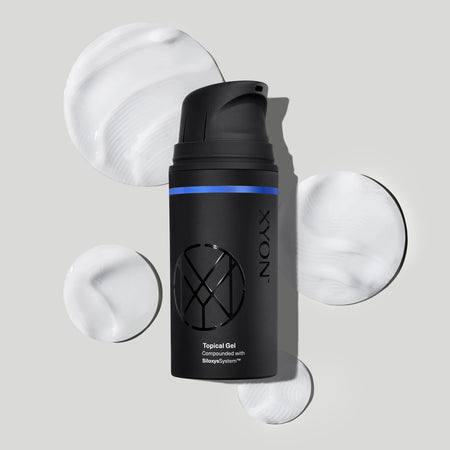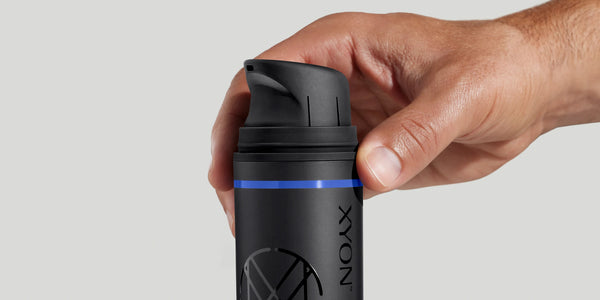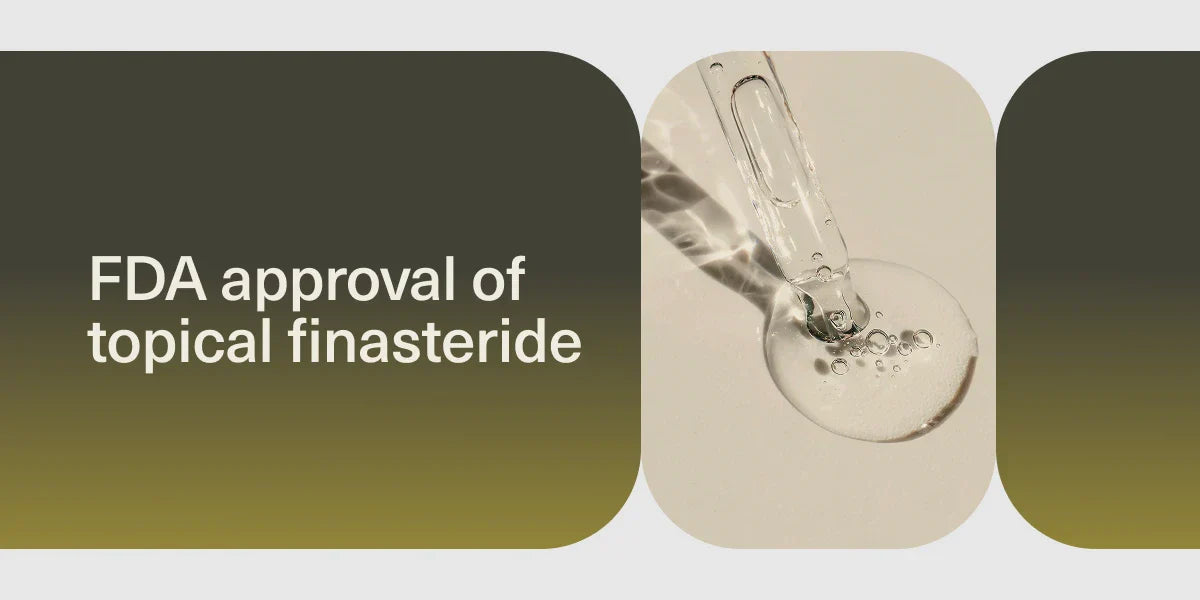In April 2025, the FDA released a warning to physicians, compounding pharmacies, and consumers about potential risks associated with the use of topical finasteride. You can read the original release here, but we wanted to provide additional information for readers who may be considering topical finasteride treatments through XYON, or current patients who may have questions about the safety of these treatments.
What was contained within the FDA warning about topical finasteride?
The FDA report states that there were 32 cases of adverse events that were reported to the FDA relating to the use of topical finasteride between 2019-2024. These side effects were generally consistent with those previously reported with oral finasteride. The report also stated that most of these side effect cases were described as “persistent” and lasted long after patients stopped taking treatment.
Other key issues highlighted by the FDA:
- Patients didn’t feel like they were adequately informed about the risks associated with topical finasteride
- Patients had been erroneously told by their prescribers that there was “no risk of adverse events because the product was topical”
- Emphasizing side effects and risks unique to topical formulations (e.g., possibility of skin irritation, risk of exposure through skin contact for women trying to become pregnant or who are pregnant or breastfeeding)
Is topical finasteride FDA-approved?
No, topical finasteride is not FDA-approved. The topical treatments available through XYON, including topical finasteride, topical finasteride and minoxidil, and topical dutasteride, are “compounded medicines”. Compounded medicines are not approved by the FDA.
The FDA nonetheless has a mandate to preserve safe access to compounded formulations prescribed by health care providers to serve important patient needs. While the FDA does not verify the safety, effectiveness, or quality of compounded medicines like they do with FDA-approved drugs, the FDA does perform oversight to ensure compounded medicines are safely prepared in licensed compounding pharmacies that meet FDA requirements.


XYON's topical finasteride in our SiloxysSystem™ Gel is available now
Finasteride has known side effects. XYON helps you maximize results while minimizing risk with precision-compounded topical formulas.
What is a compounded medicine?
Essentially, compounded medicines are variations of FDA-approved medications that have been tailored to meet the needs of specific patients. A physician may exercise their professional judgement and recommend a compounded treatment if they determine that the FDA-approved medication isn’t appropriate for a patient (for example, if a patient has trouble swallowing pills or is allergic to an ingredient in the FDA-approved version).The compounded medicine can differ from the FDA-approved version because it delivers the medication in a customized format, strength, and dosing, or with a different set of ingredients.
Topical finasteride with SiloxysSystem™ Gel is a compounded medication that differs in format and strength as compared to the FDA-approved dosage of finasteride (Proscar, Propecia) at 1 mg orally for the management of male pattern hair loss (androgenetic alopecia). A physician’s decision to prescribe a compounded formula involves weighing the potential benefits and risks of each treatment being considered. All compounded medications, including topical finasteride, require a physician’s prescription.
Why isn't topical finasteride approved by the FDA?
When a medication receives FDA-approval, this means that it has undergone a thorough process of evaluating its safety and efficacy for the treatment of a given health condition in a specific population at a specified dose and dosing frequency. This includes identifying what side effects may occur and how common they are, as well as measuring how many people respond to treatment and how good the response is. Embedded within this process is also a certification of the manufacturing process. Because compounded treatments are customized for patients, it’s not possible for the FDA to conduct a full review of efficacy and safety for every compounded treatment. The FDA similarly cannot verify the quality of prepared compounded medicines in the same rigorous way that they do with manufactured drugs.
Just because a treatment hasn’t been FDA-approved does not make it inherently harmful. Physicians can prescribe compounded medicines when the criteria described in the section above have been met. Additionally, the FDA does enforce that large compounding pharmacies follow strict standards to ensure the quality of compounded drugs. Patients should be aware that while compounded medicines exist to serve specific patient needs, they also come with their own risks and may not be suitable for everyone.
Compounded topical finasteride hasn’t been evaluated by the FDA for safety, efficacy, or quality. However, a physician may prescribe topical finasteride if they feel that the potential benefits outweigh the risks for a patient. To enable physicians and their patients to make informed decisions, companies, clinicians, and researchers may generate and share data from clinical studies, quality, and toxicology studies. However, consumers should be aware that these studies are not regulated or reviewed by the FDA and may vary greatly in terms of the degree of scientific rigor applied.
What treatments are FDA-approved for hair growth?
Currently, the only FDA-approved treatments for androgenetic hair loss are oral finasteride (1 mg, taken daily) and topical minoxidil (2% lotion or 5% foam for men and women).
What is XYON doing in response to FDA safety warnings about topical finasteride?
XYON was founded because of our shared concerns about the potential side effects of finasteride, with the goal of creating safer solutions specifically designed to minimize the risks associated with these medications. It is essential that every patient is equipped with full information about the risks of hair loss medications, including potential risks related to compounded topicals, to make an informed decision about their treatment plan.
As part of our commitment to transparency, patient empowerment, and safety, XYON is currently reviewing policies and practices to ensure we are doing everything we can to protect the wellbeing of our patients.
XYON only partners with pharmacies who specialize in preparing compounded treatments and who meet the rigorous guidelines set out in the United States Pharmacopeia (typically under ). The FDA enforces these standards to help ensure the quality of compounded medicines.
We’re working closely with prescribers to ensure that they take the time to counsel patients on the potential benefits and risks of their treatment(s), in line with FDA guidance. We’ve also implemented a quality review process to ensure that online consultations meet our high standards for care.
Furthermore, we’re conducting a thorough review of our website, consultation, and user platforms to ensure that safety information is widely accessible and comprehensive. Patients are encouraged to reach out to their prescribing doctors if they have any concerns about their treatment progress or the treatment itself. We’ve also worked to ensure that there are multiple opportunities to ask questions at every stage of the treatment journey and implemented communications to ensure that all patients know:
- Where to find important safety information
- What to do in case they experience possible side effects, and
- How to report any adverse events to the FDA or Health Canada, if they wish.
We also continue to internally document, investigate, and review any concerns reported by patients.
Topical finasteride and FDA approval: takeaway
Because we take patient safety and wellbeing seriously, we value transparent discussion about topical finasteride, what it is, and risks you should be aware of. Patients are encouraged to reach out to their prescribing doctors if they have any concerns about their treatment plan, progress, or the medication itself.
If you are considering or have been prescribed compounded topical finasteride, here are essential points to keep in mind:
- Topical formulations are NOT risk-free: using a topical medication may help reduce drug absorption, but it does not eliminate systemic exposure. There is still a possibility of experiencing side effects.
- Personalized care: there is no one-size-fits-all treatment; some people may be at a higher risk of experiencing side effects compared to others. This is why it’s important to be as honest and thorough as possible when providing your prescriber with health information during the consultation stage.
- Build your knowledge to stay safe: Thoroughly review the messages you receive from your doctor to understand how to use your medication and what you need to be aware of as you’re getting started. Follow the guidance and application instructions from your doctor.
- Know the potential side effects: familiarize yourself with the safety and usage leaflet included with every prescription, the safety information available on the website and treatment information pages, and how to contact your prescribing physician if any questions or concerns arise.
- If you think you might be experiencing side effects:
- Discontinue treatment and seek medical attention
If it’s an emergency (e.g., severe allergic reaction or psychiatric symptoms), go to the nearest hospital emergency room or call 911 - For severe side effects, seek immediate medical attention directly from a licensed medical provider in your area
- For non-severe side effects, please get in touch with your prescribing physician as soon as possible to alert them and receive guidance on what to do next (XYON patients can do so via their consultation portal)
- Consider submitting a report to the FDA or a report to Health Canada: this is entirely voluntary, and regulatory agencies will not provide a response or medical support. However, reports to these databases help agencies identify potential safety signals to form new guidance in the future
- Discontinue treatment and seek medical attention




